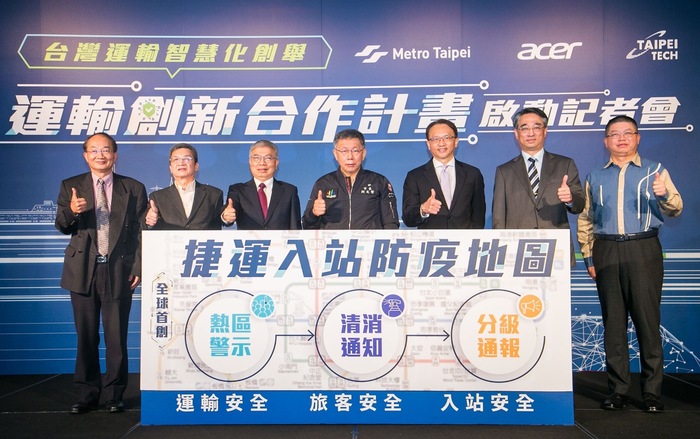AI-driven Technology to Bolster MRT Riders’ Safety

Taipei Tech, Taipei Rapid Transit Corporation (Metro Taipei) and Acer collaborate on a new project to advance MRT passengers’ safety through data analysis and AI technology. A press conference was held on November 8th to introduce the collaborative project that will innovate the transportation system in Taiwan.
Present in the press conference were Ko Wen-je, Mayor of Taipei, Jason Chen, Corporate President of Acer, Peter Chiang, Regional CEO of Acer, Lee Wen-tsung, Chairman of Metro Taipei, Huang Ching-shinn, President of Metro Taipei, Hung Yu-ming, Vice President and Director of Operations Engineering Division of Metro Taipei, Wang Sea-fue, President of Taipei Tech and Huang Yo-ping, Taipei Tech Chair Professor and Chief Convener of the project.
The three parties have established the AI Metro Safety Development Center that incorporates the state-of-the-art AI technology developed by Acer, innovative research and technical certification provided by Taipei Tech, and the integration and application support given by Taipei Metro. The collaboration brings together stakeholders from industry, government and academia that aim to build the safest and the most convenient public transit system in the world.
With the pandemic regulation becomes a part of everyday life, high-precision AI monitoring system along with the control system of the entrance gate set up at the MRT station can help to detect and prevent passengers who fail to wear facial masks or with abnormal body temperature to enter the station. The system designed by the center has the advantage of low latency to maintain efficiency. A big data platform will also be used for disease prevention, authority informing and risk level notification to safeguard the health of MRT riders.
In addition, the center is also developing another monitoring system to detect unusual passenger flow in the car and to prevent emergent and critical incident. When there is an unusual movement in the car, an emergency code and visual images of the car will be sent to the control center for an earlier response. The image analysis ran through by the AI system can also provide instant and precise information on the density and vacancy of the car to improve transportation services and passenger satisfaction.
Furthermore, an escalator safety system will also be developed to alert passengers with particular footwear (such as rubber clogs) that could cause potential injuries when using the escalator.






